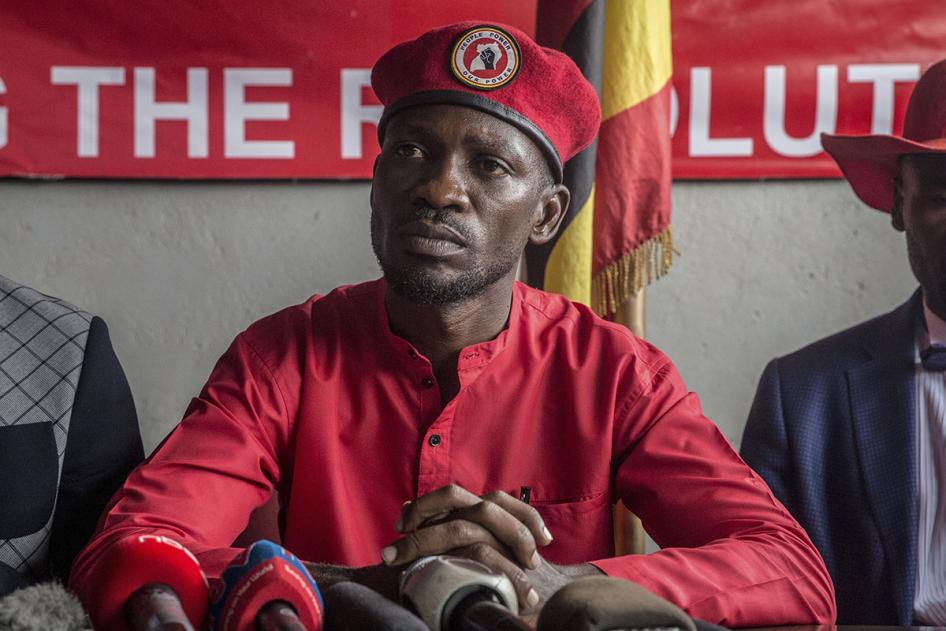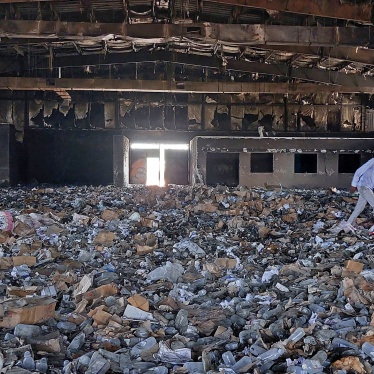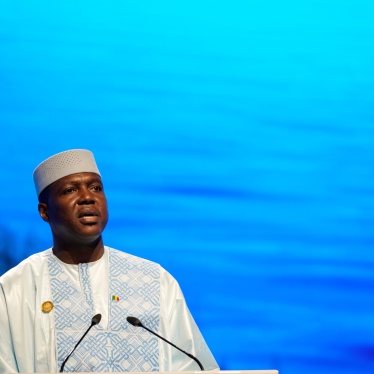(Nairobi) – The arrest and detention of presidential candidate, Robert Kyagulanyi, is a sign of the growing repression of opposition politicians ahead of Uganda’s national elections scheduled for January 2021. The Ugandan authorities should release Kyagulanyi immediately and unconditionally and respect the rights of people to peacefully protest his detention.
Security forces arrested Kyagulanyi, popularly known as Bobi Wine, on November 18, 2020, in Luuka district, Eastern Uganda, ahead of a planned campaign rally. The police spokesperson, Fred Enanga, said in a statement that Kyagulanyi, the presidential candidate of the National Unity Platform, was arrested for allegedly breaching Covid-19 regulations by mobilizing large crowds for his campaign rallies. A spokesperson for Kyagulanyi said that his lawyers have been denied access to him. The authorities responded with teargas and live bullets to the protests that followed in Kampala and elsewhere, which led to 16 deaths, with 45 people injured, the police said.
“The increasing spate of violence so early in the campaign season does not bode well for the weeks to come before the elections,” said Oryem Nyeko, Africa researcher at Human Rights Watch. “The authorities can stem the slide toward further violence by ending the harassment of journalists and opposition candidates and their supporters, and the violent disruption of their campaign rallies.”
On the same day in Gulu, Northern Uganda, the police arrested and later released another opposition presidential candidate, Patrick Oboi Amuriat of the Forum for Democratic Change (FDC) party. This was his second arrest in two days for allegedly planning an “unauthorized procession.”
Video footage circulating on social media shows men in civilian clothes apparently working alongside security forces to disperse crowds during the protests, brandishing guns on the streets of Kampala and shooting toward the sky. Human Rights Watch has not verified the authenticity of the footage or the identity of the people shown.
In the last two weeks, the authorities have used Covid-19 regulations as a pretext to violate rights and clamp down on the opposition and the media. They have arrested opposition party leaders and journalists, and dispersed opposition campaign rallies with teargas for allegedly flouting Covid-19 guidelines.
Despite attracting similarly large crowds in Kotido and Gulu, security forces allowed rallies and processions for the ruling National Resistance Movement (NRM) party to continue undisrupted.
On November 3, the police smashed the window of Kyagulanyi’s vehicle, trying to arrest him at Kyambogo University in Kampala after the Electoral Commission confirmed his nomination to run for president. Kyagulanyi told the media that the police sprayed pepper spray into his eyes during the arrest. He was later taken to his home in Magere in Kampala and released. Earlier that day police also arrested Amuriat as he made his way to Kyambogo for the presidential nominations, and later released him without his shoes.
The Kampala-based African Centre for Media Excellence reported that the police used pepper spray on journalists on November 3 as they covered a procession by Kyagulanyi’s supporters in Kyambogo and arrested Ronald Kakooza, a journalist from the Vision Group, while he covered events at the Forum for Democratic Change headquarters in Najjanankumbi, on the outskirts of Kampala. On November 5,the police shot another journalist, Moses Bwayo, in the face with a rubber bullet as he was filming Kyagulanyi arriving at his party’s office.
Since campaigns began two weeks ago, the police have violently dispersed opposition rallies and blocked opposition members from reaching their venues. On November 9, the police in Mbale fired teargas to disperse crowds as Amuriat traveled through the city to kick off his campaign in Soroti, Eastern Uganda. In Lira, police used teargas to disperse crowds ahead of Kyagulanyi’s campaign rally there on November 12.
Amid the chaos, unidentified people reportedly attacked two NBS television journalists, Daniel Lutaaya and Thomas Kitimbo, as they covered Kyagulanyi’s campaign, stealing their property – a laptop was stolen, as well as camera chargers and phones – and vandalizing their car. On November 16, police again fired teargas and live bullets to disperse crowds in Mayuge district during Kyagulanyi’s campaign events there, reportedly for not complying with Covid-19 crowd restrictions.
Any use of force and “less-lethal” weapons such as teargas must comply with international law as articulated in the United Nations Basic Principles on the Use of Force and Firearms by Law Enforcement Officials. Force should only be used when other means of de-escalation have proven inadequate. When police use force, they should ensure that it is strictly proportionate to the danger to public order posed by protesters and seek to minimize the risk of injuries and protect the rights to life and health. The police can only employ firearms in self-defense when “less extreme means,” are insufficient and it is “strictly unavoidable to protect life.” The Ugandan government is obligated to ensure that excessive use of force is subject to scrutiny and in particular that there is an effective investigation into the deaths and injuries of all civilians that leads to accountability for unlawful killings and injuries and access to a remedy for the victims.
Before the election campaigns formally started, the authorities blocked opposition meetings and rallies. In January, police blocked Kyagulanyi from conducting meetings in Gayaza, Gulu, and Lira, allegedly because he had not met all the requirements of the Public Order Management Act. Police later arrested Kyagulanyi and journalists covering his events in Gayaza and Lira, and reportedly ordered at least one reporter to delete his footage of the events.
While enforcing the government’s Covid-19 measures, earlier in the year, security forces shot at civilians and beat and arbitrarily arrested hundreds. The police arrested vendors, journalists, and lesbian, gay, bisexual, and transgender (LGBT) youth. In April, police arrested and badly beat an opposition member of parliament, Francis Zaake, for distributing food to his constituents after the government banned public and private transport, suspended non-essential services, and closed non-food markets to prevent the spread of Covid-19. The government said he failed to channel his food donations through a government-organized task force.
“The authorities have consistently used Covid-19 guidelines as an excuse for violent repression of the opposition rather than to safeguard the democratic playing field for free and fair elections,” said Nyeko, “The Ugandan government should instead focus on ensuring that the security forces respect the rule of law, are held accountable for abuses, and act in an impartial manner.”









